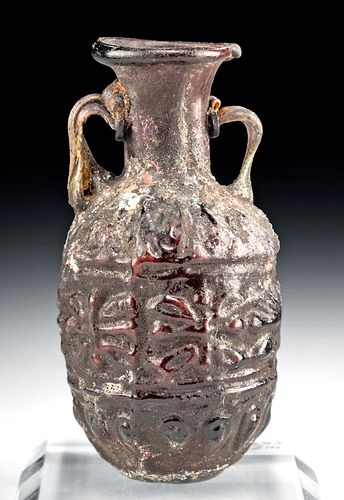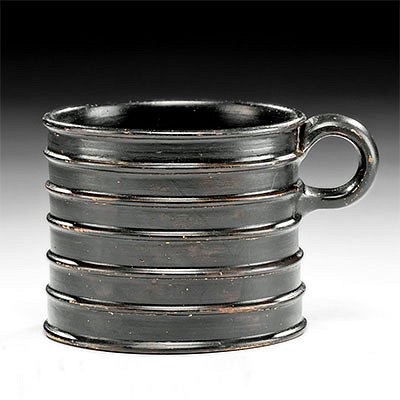Roman Sidonian Molded Glass Bottle - Aubergine
Lot 50d
About Seller
Artemis Gallery
686 S Taylor Ave, Ste 106
Louisville, CO 80027
United States
Selling antiquities, ancient and ethnographic art online since 1993, Artemis Gallery specializes in Classical Antiquities (Egyptian, Greek, Roman, Near Eastern), Asian, Pre-Columbian, African / Tribal / Oceanographic art. Our extensive inventory includes pottery, stone, metal, wood, glass and textil...Read more
Categories
Estimate:
$2,200 - $3,300
Absentee vs Live bid
Two ways to bid:
- Leave a max absentee bid and the platform will bid on your behalf up to your maximum bid during the live auction.
- Bid live during the auction and your bids will be submitted real-time to the auctioneer.
Bid Increments
| Price | Bid Increment |
|---|---|
| $0 | $25 |
| $300 | $50 |
| $1,000 | $100 |
| $2,000 | $250 |
| $5,000 | $500 |
| $10,000 | $1,000 |
| $20,000 | $2,500 |
| $50,000 | $5,000 |
| $100,000 | $10,000 |
| $200,000 | $20,000 |
About Auction
By Artemis Gallery
Mar 12, 2020
Set Reminder
2020-03-12 10:00:00
2020-03-12 10:00:00
America/New_York
Bidsquare
Bidsquare : Ancient / Ethnographic Around The World
https://www.bidsquare.com/auctions/artemis-gallery/ancient-ethnographic-around-the-world-4957
Ancient art from Egypt, Greece, Italy and the Near East, as well as Asian, Fossils, Pre-Columbian, Native American, African / Tribal / Oceanic, Spanish Colonial, Russian Icons, Fine art, much more! Artemis Gallery info@artemisgallery.com
Ancient art from Egypt, Greece, Italy and the Near East, as well as Asian, Fossils, Pre-Columbian, Native American, African / Tribal / Oceanic, Spanish Colonial, Russian Icons, Fine art, much more! Artemis Gallery info@artemisgallery.com
- Lot Description
Roman Empire, Sidonian, ca. 1st to 4th century CE. A miniature and very fine mold-blown glass vessel of deep purple hues, presenting an attractive form comprised of an ovoid body, a tubular neck rising to a gently flared and infolded rim, and twin trailed handles or blue-green hues joining neck to shoulder. The surface is mesmerizing - intricately detailed with a large central register of floral motifs flanked by linear borders followed by registers of curvilinear motifs above and below; finally an elegant spiral adorns the base. Imbuing it with even more beauty, the surface is covered in fiery iridescence of pink, lavender, silver, and ice blue hues. Sidon was a center of art glass production in ancient times, and this piece exemplifies the fine creations of this region. Size: 3.25" H (8.3 cm); 3.75" H (9.5 cm) on included custom stand.
Here are Pliny's words as he described his voyage to Sidon, "From this point on we must go back to the coast and to Phoenicia. There was formerly a town called Crocodilian, and there still is a river of that name … Then comes Cape Carmel … Next are Getta, Geba, and the river Pacida or Belus … Close to this river is Ptolemais … Next Tyre, once an island separated from the mainland by a very deep sea-channel 700 yards wide, but now joined to it by the works constructed by Alexander when besieging the place … but the entire renown of Tyre now consists in a shell-fish and a purple dye! … Next are Zarephath and the city of birds (Ornithon oppidum), and Sidon, the mother-city of Thebes in Boeotia where glass is made." (Pliny, Natural History V.75-76, 77-79 A.D.)
Provenance: ex-Stephen Shalom collection, New York, USA, 1970s
All items legal to buy/sell under U.S. Statute covering cultural patrimony Code 2600, CHAPTER 14, and are guaranteed to be as described or your money back.
A Certificate of Authenticity will accompany all winning bids.
We ship worldwide and handle all shipping in-house for your convenience.
#147845Repaired from about 3 or 4 pieces, but very well done. Form is well preserved with wonderful details. Amazing iridescence.Condition
- Shipping Info
-
All shipping is handled in-house for your convenience. Your invoice from Artemis Gallery will include shipping calculation instructions. If in doubt, please inquire BEFORE bidding for estimated shipping costs for individual items.
-
- Buyer's Premium



 EUR
EUR CAD
CAD AUD
AUD GBP
GBP MXN
MXN HKD
HKD CNY
CNY MYR
MYR SEK
SEK SGD
SGD CHF
CHF THB
THB














